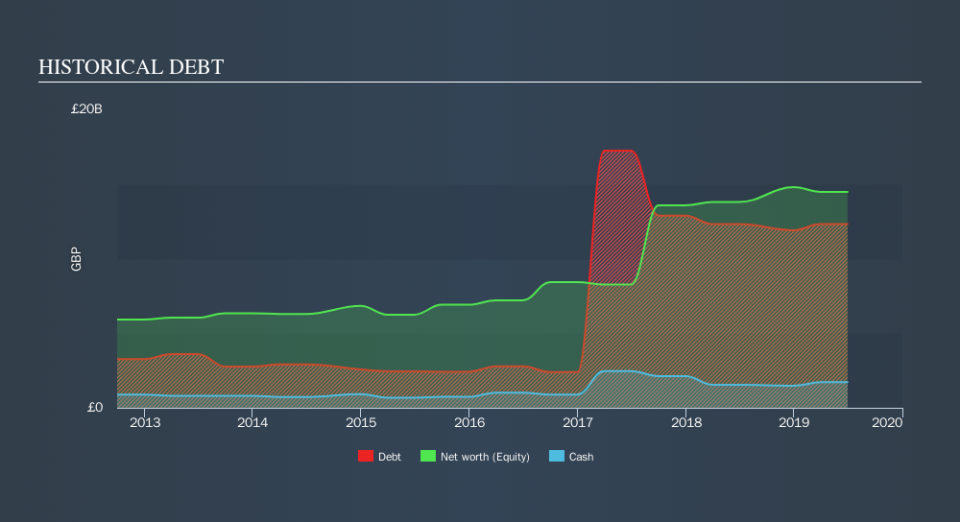Does Reckitt Benckiser Group (LON:RB.) Have A Healthy Balance Sheet?

Howard Marks put it nicely when he said that, rather than worrying about share price volatility, 'The possibility of permanent loss is the risk I worry about... and every practical investor I know worries about. When we think about how risky a company is, we always like to look at its use of debt, since debt overload can lead to ruin. As with many other companies Reckitt Benckiser Group plc (LON:RB.) makes use of debt. But is this debt a concern to shareholders?
When Is Debt Dangerous?
Debt and other liabilities become risky for a business when it cannot easily fulfill those obligations, either with free cash flow or by raising capital at an attractive price. Part and parcel of capitalism is the process of 'creative destruction' where failed businesses are mercilessly liquidated by their bankers. However, a more usual (but still expensive) situation is where a company must dilute shareholders at a cheap share price simply to get debt under control. Of course, debt can be an important tool in businesses, particularly capital heavy businesses. When we think about a company's use of debt, we first look at cash and debt together.
View our latest analysis for Reckitt Benckiser Group
What Is Reckitt Benckiser Group's Net Debt?
As you can see below, Reckitt Benckiser Group had UK£12.3b of debt, at June 2019, which is about the same the year before. You can click the chart for greater detail. On the flip side, it has UK£1.71b in cash leading to net debt of about UK£10.6b.
A Look At Reckitt Benckiser Group's Liabilities
Zooming in on the latest balance sheet data, we can see that Reckitt Benckiser Group had liabilities of UK£8.99b due within 12 months and liabilities of UK£15.1b due beyond that. Offsetting these obligations, it had cash of UK£1.71b as well as receivables valued at UK£2.14b due within 12 months. So its liabilities outweigh the sum of its cash and (near-term) receivables by UK£20.3b.
Reckitt Benckiser Group has a very large market capitalization of UK£46.7b, so it could very likely raise cash to ameliorate its balance sheet, if the need arose. But it's clear that we should definitely closely examine whether it can manage its debt without dilution.
We use two main ratios to inform us about debt levels relative to earnings. The first is net debt divided by earnings before interest, tax, depreciation, and amortization (EBITDA), while the second is how many times its earnings before interest and tax (EBIT) covers its interest expense (or its interest cover, for short). Thus we consider debt relative to earnings both with and without depreciation and amortization expenses.
Reckitt Benckiser Group's net debt is 2.8 times its EBITDA, which is a significant but still reasonable amount of leverage. However, its interest coverage of 12.8 is very high, suggesting that the interest expense may well rise in the future, even if there hasn't yet been a major cost attached to that debt. We saw Reckitt Benckiser Group grow its EBIT by 3.9% in the last twelve months. Whilst that hardly knocks our socks off it is a positive when it comes to debt. When analysing debt levels, the balance sheet is the obvious place to start. But ultimately the future profitability of the business will decide if Reckitt Benckiser Group can strengthen its balance sheet over time. So if you want to see what the professionals think, you might find this free report on analyst profit forecasts to be interesting.
Finally, a business needs free cash flow to pay off debt; accounting profits just don't cut it. So we clearly need to look at whether that EBIT is leading to corresponding free cash flow. During the last three years, Reckitt Benckiser Group produced sturdy free cash flow equating to 63% of its EBIT, about what we'd expect. This free cash flow puts the company in a good position to pay down debt, when appropriate.
Our View
On our analysis Reckitt Benckiser Group's interest cover should signal that it won't have too much trouble with its debt. However, our other observations weren't so heartening. For instance it seems like it has to struggle a bit handle its debt, based on its EBITDA,. Considering this range of data points, we think Reckitt Benckiser Group is in a good position to manage its debt levels. Having said that, the load is sufficiently heavy that we would recommend any shareholders keep a close eye on it. Over time, share prices tend to follow earnings per share, so if you're interested in Reckitt Benckiser Group, you may well want to click here to check an interactive graph of its earnings per share history.
If, after all that, you're more interested in a fast growing company with a rock-solid balance sheet, then check out our list of net cash growth stocks without delay.
We aim to bring you long-term focused research analysis driven by fundamental data. Note that our analysis may not factor in the latest price-sensitive company announcements or qualitative material.
If you spot an error that warrants correction, please contact the editor at editorial-team@simplywallst.com. This article by Simply Wall St is general in nature. It does not constitute a recommendation to buy or sell any stock, and does not take account of your objectives, or your financial situation. Simply Wall St has no position in the stocks mentioned. Thank you for reading.

 Yahoo Finance
Yahoo Finance 
